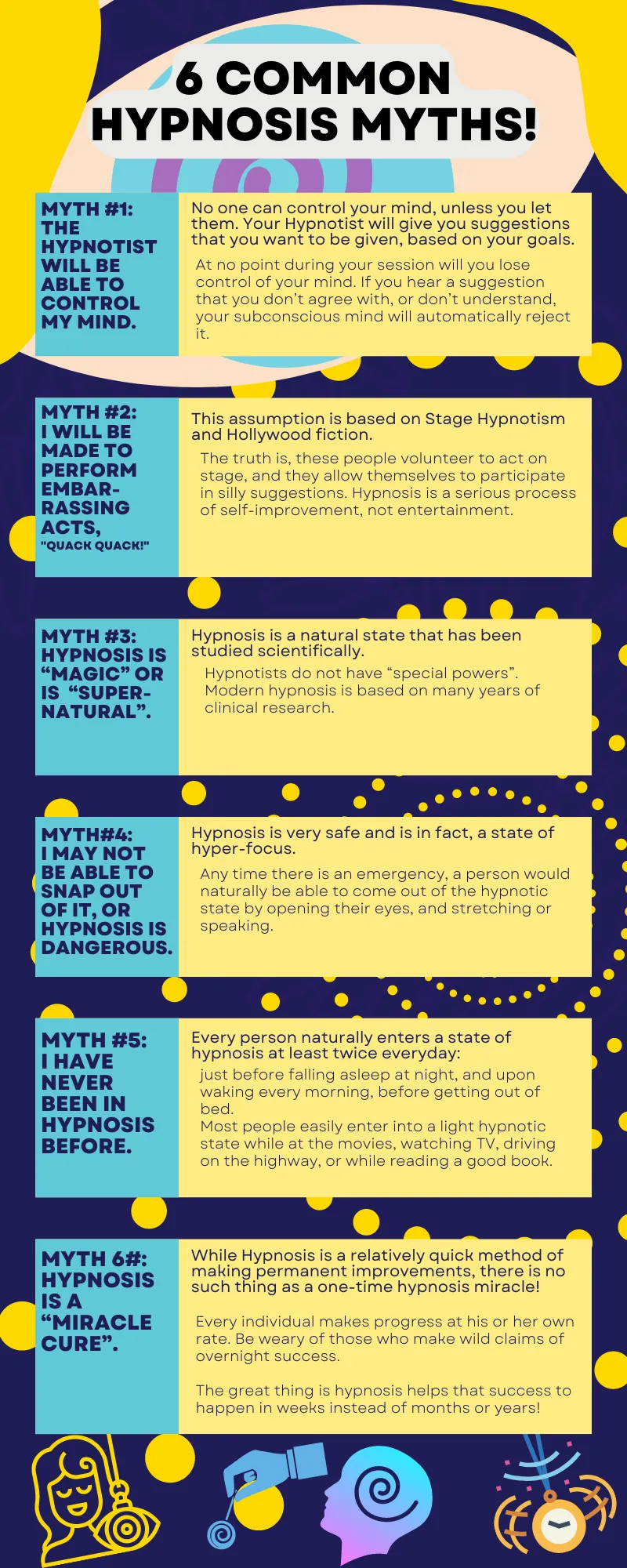FAQs
Common Questions About Hypnosis
How does hypnosis work?
Hypnosis works by achieving a level of focused awareness, and at the same time bypassing the analytical aspect of the mind. Another way to describe the analytical aspect of the mind is that it is a comparing mechanism. When new information is introduced to the mind, the comparing mechanism compares the new information to what it already believes is either true or false. This is a protective aspect of our mind.
This is why changing habits by willpower alone is so difficult – we often already believe we can not change, so thinking about making the change happen ( using willpower alone) is ineffective. Hypnosis is powerful because with focused awareness the analytical aspect of the mind is bypassed, and new, healthy and beneficial suggestions can be made directly into the subconscious, without the comparing mechanism rejecting these new beliefs. So the change we want to achieve in our life is accepted by the subconscious mind as true, and we see results quickly.
Is hypnosis safe?
Hypnosis is safe – it’s a perfectly normal and common state of mind we go into naturally everyday. You enter hypnosis regularly when daydreaming, watching a good movie, or reading a book. During these activities you remain consciously aware and in complete control, just as you do when a professional hypnotherapist assists you in entering into a state of hypnosis.
What is hypnotherapy?
Hypnotherapy is the applied use of hypnosis. Hypnosis is used to help people discover the subconscious reasons for their symptoms, behaviors, or habits. When they are discovered, certain tools and techniques are used to help release them and relearn a new positive way of thinking, subconsciously. This is called hypnotherapy.
Can I be hypnotized?
Yes of course! You’ve already been hypnotized anytime you watched an enjoyable movie, or read a good book. Hypnosis is a normal and natural state of mind that everyone has already experienced. Actually, it’s such a normal state of mind that most people don’t realize they are hypnotized. All you need to do to go into a state of hypnosis when coming into the Advanced Hypnosis office is be willing and able to follow gentle instructions for reaching a state of focused awareness.
Who will hypnotize me?
Kimberly Lorenz is a highly qualified professional. She is registered as a Board Certified Consulting Hypnotist with the National Guild of Hypnotists. In addition, she has achieved extra certification in the advanced hypnotherapy system called 5-PATH®. Rest assured that she will treat you with respect, and that your visits are completely confidential.
What I wish people would ask me about hypnosis.
Are there any risks associated with hypnosis?
Hypnosis has been proven to help conditions such as, but not limited to:
-Anxiety
-Panic Attacks
-Depression
-Phobias
For anyone with conditions listed above, and their like, hypnosis poses almost zero risk when done with an adequately trained, and certified, professional.
In my work, I help clients remove the root cause of their problem. Doing so can challenges subconsciously held beliefs.
I liken my hypnosis sessions to exercising. Sometimes your work-out leaves you feeling energized and powerful; other times the first day you have noodle-arms, then a bit of soreness, and finally stronger muscles. Every client, every session, is different, but they all leave clients with less subconscious emotional baggage and stronger in the long term!
Clients receive a Bill of Rights in my office notifying them at any time if they need the additional help of a doctor, counselor, psychologist, psychiatrist at any time, they are free to do so. They can also stop treatment at anytime.
Hypnosis is NOT appropriate for sever mental illness such as, but not limited to:
-Schizo-affective disorder
-DID
- OCD
-Psychosis
How do I find a reputable hypnotist?
In order to find a reputable hypnotherapist, look for ones with lots of good recent reviews. A lot of people will need one or more sessions to have permanent resolution of their problem; anyone who says they can "fix" you in only 1 session may not be the best choice.
Be sure they're certified. It's important to make certain that the person you choose is a member of a higher certifying organization, like the National Guild of Hypnotists.
If it sounds like I'm talking about myself here (I am), know this: The NGH offers some of the highest certification requirements around because we care deeply about what our clients experience during sessions, and after in regards to the changes they want.
Let’s just say if someone says "trust" but doesn't have any certifications whatsoever then straight away your antenna should go up. I believe it is important that clients know exactly where someone stands when assisting them in making subconscious changes.
BONUS! Find a Board Certified Hypnotist. Only 3% of hypnotists go on to become Board Certified. Guess what? I am Board Certified. This means I have taken additional, advanced, training, and meet a higher skill and knowledge minimum than the certified hypnotist.
What is the history of hypnotism?
Did you know that the word "hypnosis" is derived from the Greek word hypnos, which means sleep? It's true! Hypnosis was thought to be a type of sleep at one time.
The earliest recorded use of hypnosis dates back to ancient Egypt, where it was used in the form of dream interpretation. However, it wasn't until the 18th century that hypnosis began to be studied scientifically. In 1784, Franz Mesmer, a German physician, published a book entitled De Magnetismo Animalium in which he proposed that there was a magnetic fluid in the body that could be manipulated to heal various ailments. Mesmer's theory was met with skepticism by the medical community, but it did pave the way for further study into the potential therapeutic benefits of hypnosis.
In 1841, Scottish surgeon James Braid observed a public demonstration of animal magnetism (a term coined by Mesmer, but really it was just hypnosis) and was so impressed by what he saw that he began studying it himself. Braid eventually came to believe that the mesmerizing effects of animal magnetism were due not to a magnetic fluid but rather to the power of suggestion. He coined the term "hypnotism," -derived from the Greek word hypnos which means sleep - to describe this phenomenon and published a book in 1843.
Braid's work laid the foundation for modern hypnosis and helped to dispel many of the myths and misconceptions about it that had developed over the years. For example, Braid showed that people cannot be hypnotized against their will and that they will always revert back to their normal state waking state once the hypnotic trance has been broken.
In the early 20th century, hypnosis began to be used more frequently as a tool for psychological treatment. Milton Erickson, considered by many to be the father of modern hypnosis, helped legitimize hypnosis as a viable form of treatment and paved the way for its use in treating everything from anxiety and phobias to depression and chronic pain.
Today, hypnosis is widely recognized as an effective treatment for a variety of psychological disorders. If you think you might benefit from hypnosis, be sure to consult with a certified hypnotist/hypnotherapist who is trained in its use.
Hypnosis is an age-old practice with a long history of use in treating medical conditions. In recent years, however, it has been shown to be an effective treatment for a wide range of psychological disorders. If you think you might benefit from hypnosis, be sure to consult with a licensed mental health professional who is trained in its use.
How does one become a hypnotist?
Take an NGH approved course that gives you the minimum training to become a certified/consulting hypnotist.
What are some of the challenges a hypnotist faces?
Being taken seriously. TV and movies have created powerful myths about what hypnosis is, what it isn't, what it can and can't do, and who hypnotists are.
For a straightforward, short, answer to all of these questions watch my Welcome, Let's Talk Hypnosis series on my YouTube Channel "Expert t Kimberly Lorenz."
How did you get into hypnotism?
I spent 20 years with a painful chronic illness. After a family tragedy, I began to experience new, scarier, neurological symptoms and severe anxiety with debilitating panic attacks. During the first 20 years I had tried everything on the western, even nutritional, side of healthcare - I never really had answers - only experienced minimal temporary relief and nothing addressed or fixed the underlying problem.
After the new symptoms started I tried everything on the alternative (woo woo) side of things. Again, only temporary relief and no answers, although it did feel good. During this time I had noticed information about hypnosis in my social media. At the time, my thoughts about hypnosis were that only crazy people thought hypnosis was real!
Nothing changed or improved for a year and I was desperate, so I began to look into hypnosis. I had a feeling that it couldn't hurt, and it may help. Since my anxiety was so terrible, I didn't feel safe going to a hypnotists so I decided to become one and do the work myself.
I did become a hypnotist....and yes, it helped far beyond what I hoped!
Today all of my of my neurological symptoms, pain, anxiety, and panic attacks are gone. Even my monthly migraines are gone. I grow stronger, more independent and confident every day since that day.
If you want what I have, you can have it. All you need is some time and effort. I can help!
Is stage hypnosis real?
If you've ever watched a stage hypnotist at work, you might have been left wondering how real the whole thing actually is. After all, the people on stage seem to be doing some pretty bizarre things, things that they would never normally do. So what's the story? Is stage hypnosis real or is it just a trick?
The first thing to understand is that there is a difference between therapeutic hypnosis and stage hypnosis. Therapeutic hypnosis is what we use to help people with things like anxiety, weight loss, and quitting smoking. Stage hypnosis, on the other hand, is more about entertainment. The goal of the stage hypnotist is to get people to do things that are funny or interesting, not necessarily things that will help them in their everyday lives.
That said, there are some similarities between therapeutic and stage hypnosis. Both involve putting people into a trance-like state where they are more open to suggestions. And in both cases, it's important to select participants who are highly suggestible. People who are easily hypnotized are more likely to go along with whatever the hypnotist suggests, whether it's quitting smoking or clucking like a chicken.
So how does the stage hypnotist get people to do such crazy things? Part of it has to do with the fact that hypnosis makes people feel relaxed and more confident in themselves. They're less inhibited, so they're more likely to go along with whatever the hypnotist suggests. Additionally, the hypnotist usually picks volunteers who are eager to please and want to be the center of attention. They want to be selected for the show, so they're more likely than others to go along with whatever the hypnotist asks them to do.
Stage hypnosis can be a fun form of entertainment, but it's important to understand that it's not real in the same way that therapeutic hypnosis is real. The goal of stage hypnosis is simply to get people to do things that are funny or interesting, not necessarily things that will help them in their everyday lives. That said, if you're interested in using hypnosis for something like quitting smoking or losing weight, know that it can be a helpful tool when used correctly by a trained professional.
6 Common Hypnosis Myths!
Myth #1: The Hypnotist will be able to control my mind.
Fact: No one can control your mind, unless you let them. Your Hypnotherapist will give you suggestions that you want to be given, based on the Pre-Hypnotic Interview. At no point during your session will you lose control of your mind. If you hear a suggestion that you don’t agree with, or don’t understand, your subconscious mind will automatically reject it.
Myth #2: I will be made to perform embarrassing acts, such as bark like a dog, or walk like a duck.
Fact: This assumption is based on Stage Hypnotism and Hollywood fiction. The truth is, these people volunteer to act on stage, and they allow themselves to participate in silly suggestions. Hypnotherapy is a serious process of self-improvement, not entertainment.
Myth #3: Hypnosis comes from “Black Magic,” “Supernatural,” or Spiritually Dangerous for Christians.
Fact: Hypnosis is a natural state that has been studied scientifically. Hypnotherapists are not Psychics or Palm Readers with “special powers”. Hypnotherapy is based on many years of clinical research by famous Psychologists such as Dr. Sigmund Freud and Dr. Carl Jung, and more recently, by Dr. Milton Erikson and Dr. John Kappas.
Myth #4: If I become Hypnotized, I may not be able to snap out of it, or Hypnosis is Dangerous.
Fact: Hypnosis is very safe and is in fact, a state of hyper-awareness. Any time there is an emergency, a person would naturally be able to come out of the Hypnotic state by opening their eyes, and stretching or speaking.
Myth #5: I have never been in Hypnosis before.
Fact: Every person naturally enters a state of hypnosis at least twice a day.
Just before falling asleep at night, and upon waking every morning before getting out of bed.
Most people easily enter into a light hypnotic state while watching movies or TV, while driving, or reading a good book.
Myth #6: Hypnosis is a “Miracle Cure”.
Fact: While Hypnosis is a relatively quick method of making permanent improvements, there is no such thing as a one-time “Hypno-Miracle”! Every individual makes progress at his or her own rate. Be weary of those who make wild claims of overnight success.


Explore
Social
Hypnosis is the best alternative to therapy for healing and recovery from trauma.
Even though I call myself a hypnotist, what I really do is hypnotherapy which uses powerful hypnotic affirmations to aid in transformation.
Lorenz Hypnosis
39 W Pine Ave
Meridian, id 83642
208-606-3335

Lorenz Hypnosis
39 W Pine Ave
Meridian, id 83642
208-606-3335
Disclaimer: Services rendered by a hypnotist are held out to the public as nontherapeutic motivational and meditative coaching, defined as the use of hypnosis to inculcate positive thinking and the capacity for self-hypnosis. Services rendered are not any form of health care or psychotherapy, and despite research to the contrary, we make no health benefit claims for our services. Our work is supportive and educational, intended to enhance productivity, effectiveness and flourishing.
Testimonials: The testimonials and success stories shared on this website are the personal experiences of our clients. Results may vary and are not guaranteed. Hypnosis and coaching outcomes depend on various factors, including individual commitment and willingness to actively participate in the process. While we strive to provide accurate and honest representations of our services' potential, we recommend consulting with a qualified professional before making any decisions based on the testimonials presented.
Disclaimer: Services rendered by a hypnotist are held out to the public as nontherapeutic motivational and meditative coaching, defined as the use of hypnosis to inculcate positive thinking and the capacity for self-hypnosis. Services rendered are not any form of health care or psychotherapy, and despite research to the contrary, we make no health benefit claims for our services. Our work is supportive and educational, intended to enhance productivity, effectiveness and flourishing.
Testimonials: The testimonials and success stories shared on this website are the personal experiences of our clients. Results may vary and are not guaranteed. Hypnosis and coaching outcomes depend on various factors, including individual commitment and willingness to actively participate in the process. While we strive to provide accurate and honest representations of our services' potential, we recommend consulting with a qualified professional before making any decisions based on the testimonials presented.
lorenzhypnosis.com - All Rights Reserved 2024 - Terms & Conditions

